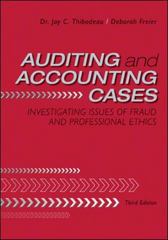An IRU is an irrevocable right to use specific fiber-optic cable or fiber capacity for a specified
Question:
An IRU is an irrevocable right to use specific fiber-optic cable or fiber capacity for a specified period. Qwest treated IRU sales as sales-type leases, which allow a seller to treat a lease transaction as a sale of an asset with complete, up-front revenue recognition. According to GAAP, this type of up-front revenue recognition required (1) completion of the earnings process; (2) that the assets sold remain fixed and unchanged; (3) full transfer of ownership, with no continuing involvement by the seller; and (4) an assessment of fair market value of the revenue components. In addition, as part of the completion of the earnings process, the assets being sold had to be explicitly and specifically identified.
Portability Qwest generally allowed customers of IRUs the ability to port, or exchange, IRUs purchased for other IRUs. By mid-2001 Qwest had ported at least 10 percent of assets sold as IRUs. Portability was not uncommon in the telecommunications industry because companies needed the flexibility to change their networks as demand changed.4 However, Qwest salespeople often granted customers the right to port through secret side agreements or verbal assurances—allegedly due to the fact that the practice of porting jeopardized Qwest’s ability to recognize revenue on IRUs up front. For example, in the fourth quarter 2000 Qwest sold to Cable & Wireless \($109\) million of capacity in the United States (and recognized \($108\) million in up-front revenue) by providing a secret side agreement, which guaranteed that Cable & Wireless could exchange the specific capacity it purchased at a later date.5 As another example, in the first quarter of 2001 Qwest sold IRU capacity to Global Crossing and recognized \($102\) million of up-front revenue after it gave secret verbal assurances to Global Crossing that Qwest would agree to exchange the capacity when the IRU capacity that Global Crossing actually wanted became available.6 Ownership Transfer Qwest also allegedly had a significant continuing involvement with all IRUs sold in the form of ongoing administrative, operating, and maintenance activities.
Although Qwest’s IRU sales agreements generally provided for title transfer at the end of the lease terms, conditions also allegedly existed requiring that in reality the title remain with Qwest.7 Interestingly, there was no statutory title.......
Case Questions
1. Describe specifically why the up-front revenue recognition practice for sales of IRUs by Qwest was not appropriate under Generally Accepted Accounting Principles (GAAP).
2. Based on your understanding of audit evidence, did Arthur Andersen rely on sufficient and competent audit evidence in its audit of Qwest’s up-front revenue recognition processes? Why or why not?
3. Identify one relevant financial statement assertion related to revenue recognized for IRU sales by Qwest. Why is it relevant?
4. For the assertion identified in Question 3, identify a specific internal control activity that would help prevent or detect a misstatement related to the practice of up-front revenue recognition of IRUs by Qwest.
Step by Step Answer:

Auditing And Accounting Cases Investigating Issues Of Fraud And Professional Ethics
ISBN: 9780078110818
3rd Edition
Authors: Jay Thibodeau, Deborah Freier





